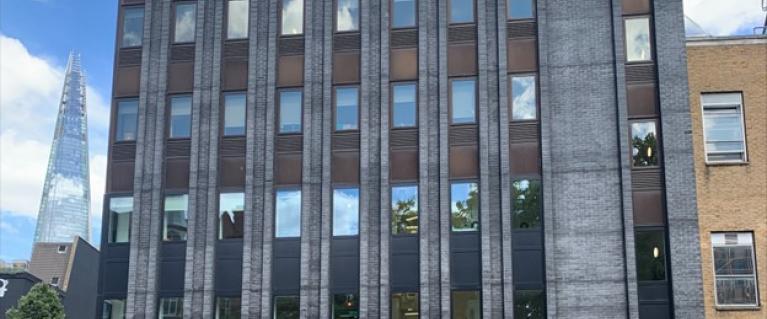
London Marathon events
London Marathon Events (LME) is an events company inspired by activity. They organize annual mass participation events to promote running, cycling and swimming in the capital. These include the London Marathon and Ride London, attracting over 120,000 participants in the last year. LME and its staff are inspired by climate and are taking bold steps to reduce the organisation’s carbon footprint.
Environmental sustainability is a key pillar for LME adopting a core focus on waste reduction and recycling at their events. Actions taken include printing runner numbers on demand, reducing the number of bottles on route, and increasing their overall recycling rate by 60%. Since 2020, LME has published annual environmental impact reports, setting out the waste and emissions from their events and other operations, as well as the sustainability efforts that they are undertaking.
Joining the BCC
LME learned about the Challenge through their building neighbours, House of Sport, who had enrolled earlier. The BCC aligns with LME’s sustainability ethos allowing them to address their building emissions.
Andrew Abdelmassih, LME Facilities Manager explains:
We were motivated to apply to support and lead London emissions’ reductions. [Better Bankside's former Sustainability Manager] Amandeep's enthusiasm was contagious. I thought it was a good project to be a part of and be motivated by during COVID.
For LME, the most valuable component of the BCC has been the technical support received through one-to-one discussions with Turner and Townsend (T&T) and knowledge sharing with other participating organisations. T&T provided advice on energy reduction actions. It helped LME to understand their energy consumption allowing staff to assess their consumption patterns, address anomalies and make continual improvements. Engaging with other firms in the challenge allowed LME to discuss new energy saving options and overcome challenges to these.
Taking action and learning new skills

LME began to implement “quick win” energy conservation measures straight after T&T audited their building. They quickly identified that they could switch their heating, ventilation and air conditioning (HVAC) system to “optimizing” mode and adjust it to better match office usage patterns. The firm has reduced their energy consumption by 34 per cent and saved £6000 pounds in the pilot year.
The top three low-cost actions LME has implemented since receiving recommendations are:
- Ensuring the server room setpoint temperature is set to 21 degrees.
- Encouraging staff to switch off appliances when not in use.
- Adjusting HVAC controls to match office use patterns.
Facilities Manager Andrew Abdelmassih has incorporated monitoring energy usage into his regular routine to troubleshoot and identify ways to reduce energy use spikes. He has been testing options to reduce LME’s energy consumption as fewer people work from the office than before the pandemic.
Andrew Abdelmassih from LME says:
I am discovering new things and learning in the process by seeing my data. For example, where is the power coming from? What appliances are on?
One of the things Andrew discovered was that the building's HVAC system was operating continuously on the ground floor, even though it was completely unoccupied. Andrew then found that he could save energy by having the system on come online in this area for two hours during office hours.
Andrew recognised the importance of getting staff on board to save energy, by encouraging staff to adopt practices like as turning computers, printers and meeting room lights off when unused. But since behaviour change can be challening Andrew decided to go one step further, installing smart plugs for office equipment. He can now schedule when appliances come on and off from his phone and track usage.
The upskilling element is crucial for the firm. Having committed and motivated staff who apply the BCC's learnings has had a real impact.
What recommendations would you give to other businesses in their path to lower their carbon emissions?
Andrew Abdelmassih from LME says:
Take the time to learn and look at your half-hourly energy data. See if there are spikes in energy and what appliances are on. Do you need to have them all? Can you put a timer? Find a balance between reducing consumption and keeping people happy.